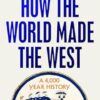| Format | Hardcover |
|---|
How the World Made the West: A 4,000-Year History
$46.99 Save:$9.00(15%)
Available in stock
| Print length: | 576 pages |
|---|---|
| Language: | English |
| Publisher: | Bloomsbury Publishing |
| Publication date: | 4 June 2024 |
| Dimensions: | 15.29 x 2.9 x 23.39 cm |
| ISBN-10: | 152660518X |
| ISBN-13: | 978-1526605184 |
People Also Viewed
-
 Dragon Ball Super, Vol. 19 (Volume 19)
$13.02
Dragon Ball Super, Vol. 19 (Volume 19)
$13.02
-
 The Star Wars Archives. 1977–1983
$160.26
The Star Wars Archives. 1977–1983
$160.26
-
 2025 13 Moon Oracle® Lunar Calendar: Harmonize Your Life: Align With Natural Lunar Cycles by Embodying the Divine Feminine Wisdom of The 13 Moon Oracle
$44.59
2025 13 Moon Oracle® Lunar Calendar: Harmonize Your Life: Align With Natural Lunar Cycles by Embodying the Divine Feminine Wisdom of The 13 Moon Oracle
$44.59
-
 The Castor Oil Bible: The Complete Collection of Barbara O'Neill's Science-Backed Healing, Beauty, and Holistic Wellness Castor Oil Proven Remedies
$24.36
The Castor Oil Bible: The Complete Collection of Barbara O'Neill's Science-Backed Healing, Beauty, and Holistic Wellness Castor Oil Proven Remedies
$24.36
-
 Sandwich: From the much-loved author of We All Want Impossible Things
$25.33
Sandwich: From the much-loved author of We All Want Impossible Things
$25.33
Description
A BOOK OF THE YEAR FOR: The Times / Sunday Times, Observer , Economist, Guardian , BBC History Magazine, i-paper and History Today ‘ Quinn has done a lot more than reinvent the wheel. What we have here is a truly encyclopaedic and monumental account of the ancient world’ THE TIMES ‘One of the most fascinating and important works of global history to appear for many years’ WILLIAM DALRYMPLE The West, the story goes, was built on the ideas and values of Ancient Greece and Rome, which disappeared from Europe during the Dark Ages and were then rediscovered by the Renaissance. But what if that isn’t true? In a bold and magisterial work of immense scope, Josephine Quinn argues that the real story of the West is much bigger than this established paradigm leads us to believe. So much of our shared history has been lost, drowned out by the concept – developed in the Victorian era – of separate ‘civilisations’. Moving from the Bronze Age to the Age of Exploration, How the World Made the West reveals a new narrative: one that traces the millennia of global encounters and exchange that built what is now called the West, as societies met, tangled and sometimes grew apart. From the creation of the alphabet by Levantine workers in Egypt, who in a foreign land were prompted to write things down in their own language for the first time, to the arrival of Indian numbers in Europe via the Arab world, Quinn makes the case that understanding societies in isolation is both out-of-date and wrong. It is contact and connections, rather than solitary civilisations, that drive historical change. It is not peoples that make history – people do. ‘A work of great confidence, empathy, learning and imagination’ RORY STEWART ‘Bold, beautifully written and filled with insights . . . Extraordinary’ PETER FRANKOPAN | ASIN : 152660518X | ISBN13 : 9781526605184.0 | ISBN-13 : 978-1526605184
Reviews (0)
Only logged in customers who have purchased this product may leave a review.













 No products in the cart.
No products in the cart. 
Reviews
There are no reviews yet.